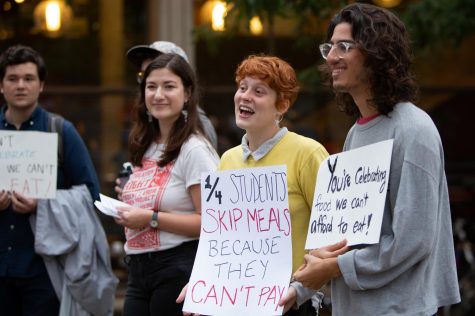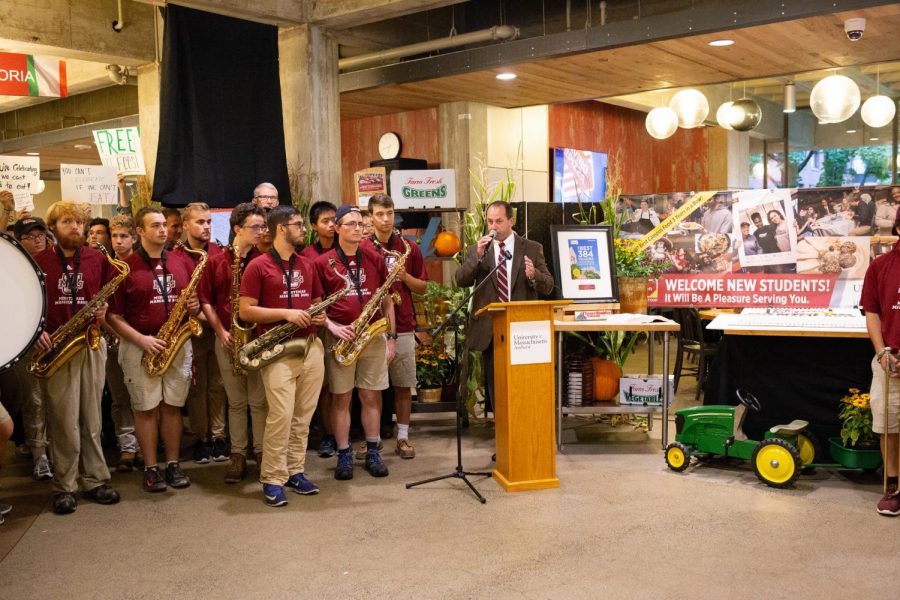Roughly 25 students from five major campus organizations gathered outside Hampshire Dining Commons at 6 p.m. to protest the rising fees of meal plans at the University of Massachusetts on Sept. 12. Strategically, the protest also took place during UMass Dining’s celebration of its third consecutive “Best Campus Food” ranking by the Princeton Review.
Last semester, the Center for Education Policy and Advocacy protested the rise in meal plan fees from UMass Auxiliary Services. The meal plan fees were ultimately increased, resulting in a 2.98 percent increase to the “unlimited” meal plan, bringing it from $2,978 to its current $3,067.
“We really just want to be here to say that it’s not okay,” said Lou Purington, organizer of the protest, “It’s not okay that they continue to raise fees, that they are cutting back services, that they continuously just disregard the needs of the students.”

This semester, students representing CEPA, the Food Access Coalition, the Graduate Employee Organization, the Resident Assistant and Peer Mentor Union, the Food Recovery Network and general supporters stood outside the steps of Hampshire holding signs which read, “YOU CAN’T CELEBRATE IF WE CAN’T EAT” and “1/4 STUDENTS SKIP MEALS BECAUSE THEY CAN’T PAY,” while students walked by the dining commons.
According to Plum Harris, one of the student organizers, the rise of meal plans has personally affected them.
“I could hardly come to school this semester and I had a conversation with the financial advisor, and they told me to reduce my meal plan to the basic one where you only get two meal swipes a day – so not even enough for you to have three meals a day on campus – because they said it would reduce my meal plan by $400,” they said. “I had to spend my own personal money so I could have an extra f*****g meal swipe.”
After a while of protesting outside, one of the student organizers, Jon Blum, reorganized the group to go inside Hampshire where they planned to silently protest the UMass Dining celebration.
The celebration began with a performance by the UMass marching band; the sounds of loud drums and trumpets quickly drew a crowd of students and dining workers. Following the performance were several short speeches by Steve Goodwin, Deputy Chancellor and Chief Planning Officer, Ken Toong, Executive Director of Auxiliary Enterprises at UMass and Robert Franek, Editor-in-Chief of the Princeton Review who all spoke about the merits of UMass dining.
While delivering their individual speeches, protesters strongly held up their signs amongst the crowd to draw attention to the cause. However, the effort drew no effect.
Once the speeches were over, the protesters met with Goodwin in the back of the dining commons to express their concerns over the rising cost of meal plans.
One of the protesters, Mitchell Manning, a graduate student in labor studies, spoke on the irony of the University attempting to progress itself.
“There is a larger issue of the University trying to rise to the top 20. It’s trying to get in all different departments to be, you know, really stellar – ‘UMass dining is excellent’ and ‘UMass dining is amazing’— and it’s something a lot of people talk about. But we need to think about who can’t access it and who we leave behind when we try to skyrocket to number one or number 20.”
In response, Goodwin asked the protesters if they had any viable solutions to prevent the increase of meal plan fees at the school.
One of the solutions the protesters expressed was to cut back on the cost of “luxury” meals UMass offers, specifically the dogfish meal which was served that day and the lobster dinner served on Halloween.
“If you put that money into meal plans, more students could actually eat food instead of starving,” said Purington.
However, one of the biggest points made during the impromptu meeting was by Blum, who said the problem of unaffordable meals plans lies within the lack of state funding and not the University. Blum stated that since 2000, state funding toward universities has declined, engendering higher fees.
Goodwin agreed as well, saying, “There is a lot of conversation going on in the administration about these issues about things like food insecurity but also the overall costs. We realize when the students think about going to the University, they have to pay all of those costs.”
Goodwin also stated that he believed that there will be more conversations on the issue of rising costs at UMass and food insecurity.
Alvin Buyinza can be reached at [email protected] and followed on Twitter @abuyinza_news.





















amy • Sep 14, 2018 at 12:05 am
The answer is..socialism!
Ed Cutting, EdD • Sep 13, 2018 at 2:39 pm
UMass hasn’t cared about costs in 30 years, if ever — it is either demand more from the state and/or charge the students more. And that needs to be addressed.
The amount of money that is wasted is obscene.
Stephanie Higgins • Sep 13, 2018 at 12:49 am
“However, the effort drew no effect.” Was the meeting with Goodwin not a direct effect of protesters’ presence? This feels incongruous.